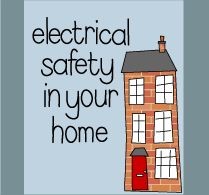Electrical Safety Hazards - Tips to Prevent Them

Electricity is a beautiful thing. It provides warmth in the winter and cools you off during hot summer months. It gives you light in the dark and makes chores like washing/drying clothes and doing dishes so much easier. You take it for granted because you’ve always had it and you certainly can’t even imagine what life would be like without it. Because it is such a normal part of your life, you probably don’t stop to think about how dangerous it can be. It is important to be educated about possible electrical problems in your home so that you will know how to deal with them before they happen.
- Do you know how old your home is? Often older homes don’t have the capacity for electricity that current technology uses. If you have never had an electrical safety inspection by a professional, now is the time to do so. If your home’s electrical wiring has not been updated to safely handle all the current that your family uses, it is crucial to have it done .
- Is your electrical panel hot to the touch? It shouldn’t be. Check the brand of your panel. Several brands are outdated or faulty and should be replaced. A faulty electrical panel can lead to a fire. That is not something anyone should risk.
- Outlets should not be hot either. If you feel an electrical outlet and it is warm or hot, it means there could be a problem. There are dangerous issues indicated by a warm/hot outlet. Whether it’s too much demand on the outlet, faulty or melting wiring, or other precarious situations, you don’t want to ignore it.
- Keep plugged in appliances away from water. This seems obvious, right? But sometimes limited space forces us to use electrical appliances near sinks or bathtubs. Whether you are blow-drying your hair at your bathroom vanity or your kitchen only has one plug for your toaster and it’s right by the sink, be extra careful. If a plugged-in appliance gets wet, don’t unplug it. Go to your electrical panel and unplug the power source for the outlet you’re using. Then you can unplug it.
- Make sure you are using the correct wattage light bulbs. Using a higher wattage than can safely be accommodated by a lamp or light fixture may overload its wiring, which is a fire hazard. It’s ok to use a light bulb with wattage equal to or less than that called for on the lamp’s socket. If you want brighter light, look for a lamp that uses a higher wattage bulb.
- Use an experienced, licensed electrician to handle your home’s electrical repairs and/or replacements. Professional electricians are well-trained and have years of on-the-job experience before being granted a license. They will know current codes and regulations and can safely navigate any problems they might come across.
It’s easy to prevent electrical hazards if you are informed and educated about what to be aware of. So, don’t take electricity or your family’s safety for granted!
http://www.homesforsaleinmontgomeryalabama.com/Blog/Organizing-Your-Home-Made-Simple
http://www.homesforsaleinmontgomeryalabama.com/Blog/Tips-for-Remodeling-Your-Home-and-Where-to-Start










